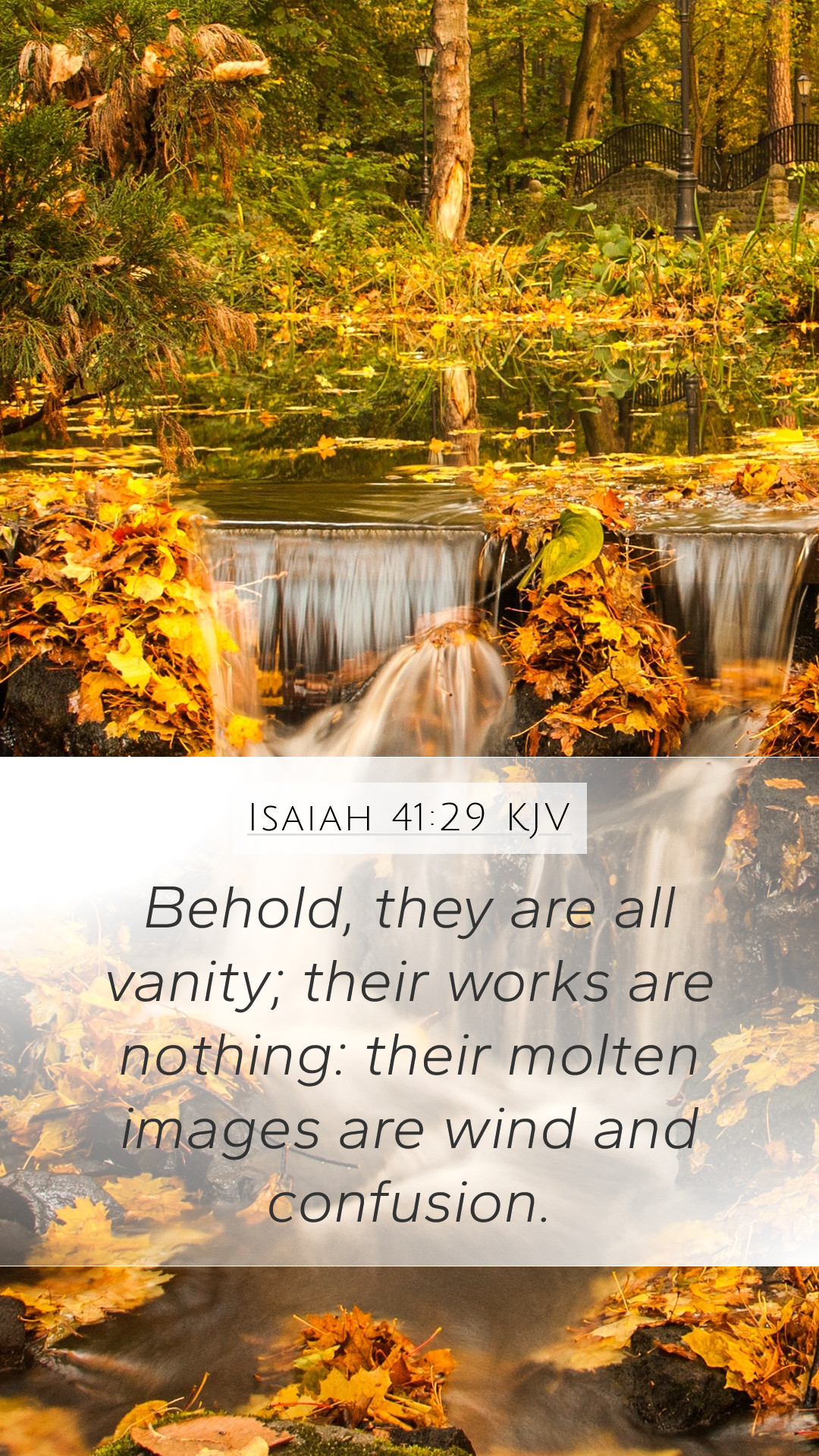Understanding Isaiah 41:29: A Comprehensive Commentary
Isaiah 41:29 states, "Behold, they are all vanity; their works are nothing: their molten images are wind and confusion." This verse expresses the futility of idols and the emptiness of false worship. Below, we delve into the meanings, interpretations, and insights derived from public domain commentaries, including contributions from Matthew Henry, Albert Barnes, and Adam Clarke.
Verse Breakdown
The verse can be divided into key components to enhance understanding:
- Vanity of Idols: The term "vanity" denotes the insufficiency and ultimate emptiness of idols.
- Works are Nothing: This emphasizes that human efforts apart from God are futile.
- Molten Images: Referring to crafted idols, this indicates the lifelessness of such creations.
- Wind and Confusion: These metaphors illustrate the lack of substance and the chaos associated with idol worship.
Insights from Commentators
Matthew Henry's Commentary
Matthew Henry emphasizes the pointlessness of relying on idols for any form of redemption or guidance. He suggests that the worship of false gods leads only to disappointment, as their "works are nothing."
Albert Barnes' Notes
Albert Barnes elaborates on the idea that the molten images symbolize false belief systems that cannot provide true support or answers in times of need. He stresses that their inadequacy is marked by their inability to offer hope or salvation.
Adam Clarke's Exposition
Adam Clarke offers a detailed analysis of the term "wind," interpreting it as a representation of the fleeting nature of human-made objects of worship. Clarke argues for the transient pleasures they offer, ultimately being replaced by confusion and despair.
Theological Significance
The theological implications of Isaiah 41:29 extend beyond mere recognition of idol futility. They inform a deeper understanding of God's sovereignty and the divine promise to provide for His people. This understanding leads believers to reflect on:
- The reality of God's existence: Unlike idols, God is alive and active.
- The call to authentic worship: True worship must center around the living God.
- The futility of materialism: Pursuing anything other than God leads to emptiness.
Practical Applications
This verse encourages believers in various aspects of life:
- Daily Reflection: Consider what idols might be present in one's life and seek to replace them with God-centric practices.
- Engagement in Bible Study Groups: Utilize this scripture for discussion in Bible study lessons focusing on the nature of true worship.
- Integration into Prayer Life: Acknowledge the futility of worldly pursuits during personal prayers.
Cross References
This verse resonates with several other passages in the Bible, reinforcing its message:
- Isaiah 44:9-20 - Discusses the futility of idolatry.
- Jeremiah 10:3-5 - Portrays the impotence of idols crafted by human hands.
- Psalm 115:4-8 - Conveys the lifelessness of idols and their worshippers.
Conclusion
In summary, Isaiah 41:29 serves as a vital reminder of the emptiness of false worship and the necessity of focusing on the true God. Through the insights of prominent commentators, this study nurtures a comprehensive understanding of scripture, enhancing one's ability to interpret biblical texts meaningfully.
Further Study
To deepen your understanding of this and other Bible verses, engage with additional resources:
- Bible study tools: Utilize commentaries, concordances, and various translations.
- Online Bible study courses: Learn from structured modules that can enhance your interpretation skills.
- Bible study materials: Explore literature that tackles difficult passages and provides insights.


